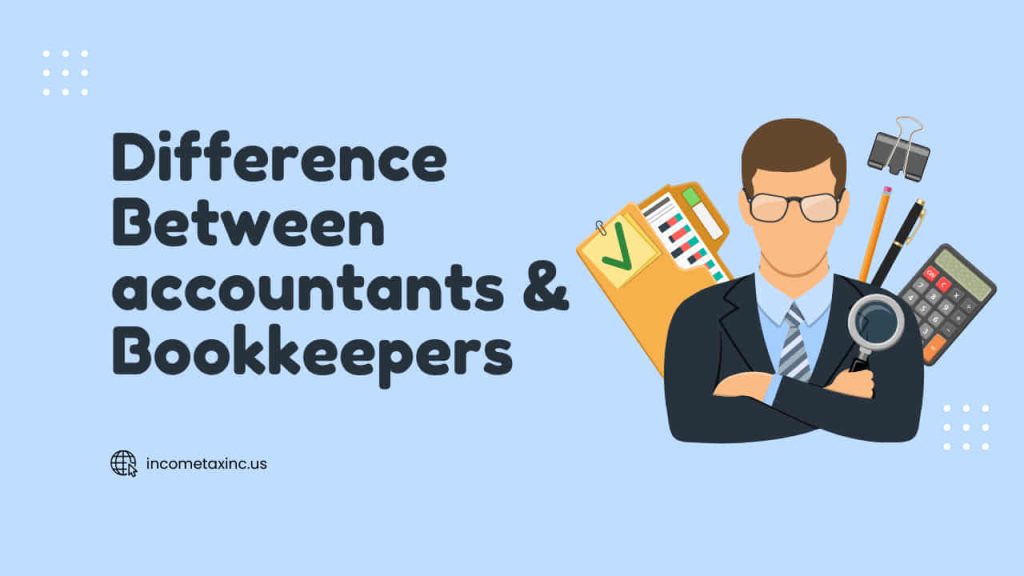Bookkeeping vs. Accounting: What’s the Difference?
Managing your cash flow on your own may get more complicated as your firm expands and you add more clients, suppliers, and workers. So it is necessary to know the Difference Between Accountants and Bookkeeper before hiring someone for your business.
When managing the financial records of your small company becomes too much for you to manage alone, it is time to bring in professionals. However, do you need the services of an accountant or bookkeeper? Although there is considerable overlap in their respective functions, the phrases should be used in various ways. The information you need to choose wisely is provided here.
Bookkeeper
Historically, bookkeeping may be traced back to roughly 2600 B.C., when commercial activity was first documented. The bookkeeper’s job is to maintain complete and accurate records of the company’s financial dealings. Bookkeepers are responsible for keeping accurate records of all financial transactions in a clear and organized format.
Accountants can execute bookkeepers’ work due to the information in their records. However, some people think that accountants and bookkeepers are the same, but there is a Difference Between Accountants and Bookkeeper.

Function of the bookkeeper
The function of the bookkeeper is both administrative and transactional since it is responsible for keeping track of regular business activities such as purchases, sales, and payments. Accounting department chair and professor at the University of Wisconsin Whitewater, D’Arcy Becker says, “Bookkeeping is intended to offer statistics on the actions of an organization.”
The following are examples of everyday bookkeeping duties:
- Keeping track of monetary dealings
- Financial transactions include: Recording debits and credits
- To create invoices
- The Handling of Payroll
- The keeping and balancing of books, records, and subsidiaries
General Ledger
A general ledger is one of a bookkeeper’s most essential tools, and it is where they keep track of money coming in and going out. Ledgers, which maintain track of business transactions, can be anything from a sheet of paper to intricate bookkeeping software.
Certification and License for bookkeeping
In most cases, a bookkeeper’s ability to manage the financial records of their clients and employers does not need certification; however, a license is required. Bookkeepers may get certification and official recognition from either the “American Institute of Professional Bookkeepers (AIPB)” or the “National Association of Certified Public Bookkeepers (NACPB).” Bookkeepers need 2,000 hours of professional experience, a passing grade on a test, and an agreement to abide by a code of ethics to become certified public bookkeepers. To keep their license valid, they must complete 24 hours of continued education annually.
Importance of professional bookkeeping certification
A bookkeeper who has earned professional certification has shown dedication to the field, mastery of relevant skills, and eagerness to grow professionally via continuing education. However, accountants grow by experiencing new things and scenarios in their daily tasks, so there exists a difference between accountant and bookkeeper.

Advantages of Bookkeeper
Agrees, a professional services agency, claims that employing a bookkeeper to maintain your company’s financial records has several benefits. A few examples are shown below.
- Organizational services:
Bookkeepers provide organizational services by keeping track of and arranging your company’s financial records and reports. Your bookkeeper may save you money on accounting expenses if you engage an accountant down the road, and they already have thorough records of your firm to reference.
- Lower cost:
The rates charged by bookkeepers are often less than those of accountants, saving you money. The actual amount relies on the complexity of your filing requirements and the number of supporting documents you must provide.
- Direct assessments:
- A bookkeeper can give you a more in-depth analysis of your business’s financial health than an accountant can. However, accountants may need to provide consistent or accurate findings.
Accountant
When an accountant receives a company’s financial data from a bookkeeper, they analyze it to provide the business owner with insights for future financial and commercial decisions. Some everyday accounting duties include the following:
- Checking and evaluating data
- Several financial papers need to be created, audited, and compiled, including tax returns, income statements, and balance sheets.
- Forecasts, company trends, and expansion prospects may all be gathered from this data.
- Insight into the effects of the owner’s financial choices
- Adjusting account books
Through the accounting process, you can get reports that synthesize crucial parts of your company’s financial situation, illuminating their significance, recommending courses of action, and providing insight into the likely future success of your organization.
Credentials required for Accountant
The competence of an accountant is determined by their education, licensing, and certifications. The minimum educational requirement for entry into the accounting profession is a bachelor’s degree from a recognised institution.
Accountants may increase their marketability and career opportunities by earning one of many different accounting certificates. “Chartered Financial Analyst (CFA)” and “Certified Internal Auditor (CIA)” are two more typical accounting certifications alongside Certified Public Accountant (CPA) (CIA).
The Uniform Certified Public Accountant Examination (Uniform CPA Exam) is a requirement for becoming a Certified Public Accountant (CPA). They must also continue their education to keep their certifications valid. In contrast, there are no requirements for the bookkeepers. So, this makes the Difference Between Accountants and Bookkeeper.
Advantages of Accountants
The advantages of using a small company accountant are considerable. Following are some of how an accountant can help your company more than a bookkeeper.
- Analysis: An accountant can assess your business’s financial situation and offer insightful recommendations. In contrast, bookkeepers are only accountable for keeping track of monetary transactions.
- Expertise: Compared to bookkeepers, accountants need more education, certificates, and experience. Only some people are more equipped to handle complex financial matters like taxes and securities than certified public accountants.
- Legal assistance: With their training and experience, accountants may gather financial proof or data to assist your company in coping with legal concerns. A company can avoid audits and other IRS problems with an accountant’s knowledge of corporate taxes.
Conclusion
There is immense importance in bookkeeping and accounting. However, there is also a huge Difference Between Accountants and Bookkeeper that everyone should know if they want to manage their business finances effectively. Depending on the business’s size, growth, and comfort level, a bookkeeper or accountant may be worth the investment to ensure financial success. A successful business decision relies on accurate record-keeping and financial accounting, regardless of whether the owner is tracking transactions or looking at the big picture. Let us know what you think; which is better, accounting or bookkeeping?
Read more:

